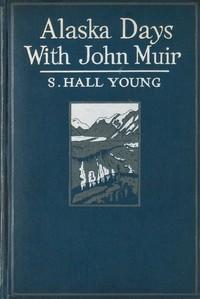Read this ebook for free! No credit card needed, absolutely nothing to pay.
Words: 30900 in 8 pages
This is an ebook sharing website. You can read the uploaded ebooks for free here. No credit cards needed, nothing to pay. If you want to own a digital copy of the ebook, or want to read offline with your favorite ebook-reader, then you can choose to buy and download the ebook.


: Alaska Days with John Muir by Young Samuel Hall - Alaska Description and travel; Muir John 1838-1914 Travel Alaska; Young Samuel Hall 1847-1927 Travel Alaska; Natural history Alaska Travel
sight of the sunset from the top."
Fifteen years of enthusiastic study among the Sierras had given him the same pre-eminence over the ordinary climber as the Big Horn of the Rockies shows over the Cotswold. It was only by exerting myself to the limit of my strength that I was able to keep near him. His example was at the same time my inspiration and despair. I longed for him to stop and rest, but would not have suggested it for the world. I would at least be game, and furnish no hint as to how tired I was, no matter how chokingly my heart thumped. Muir's spirit was in me, and my "chief end," just then, was to win that peak with him. The impending calamity of being beaten by the sun was not to be contemplated without horror. The loss of a fortune would be as nothing to that!
We were now beyond the flower garden of the gods, in a land of rocks and cliffs, with patches of short grass, caribou moss and lichens between. Along a narrowing arm of the mountain, a deep canyon flumed a rushing torrent of icy water from a small glacier on our right. Then came moraine matter, rounded pebbles and boulders, and beyond them the glacier. Once a giant, it is nothing but a baby now, but the ice is still blue and clear, and the crevasses many and deep. And that day it had to be crossed, which was a ticklish task. A misstep or slip might land us at once fairly into the heart of the glacier, there to be preserved in cold storage for the wonderment of future generations. But glaciers were Muir's special pets, his intimate companions, with whom he held sweet communion. Their voices were plain language to his ears, their work, as God's landscape gardeners, of the wisest and best that Nature could offer.
No Swiss guide was ever wiser in the habits of glaciers than Muir, or proved to be a better pilot across their deathly crevasses. Half a mile of careful walking and jumping and we were on the ground again, at the base of the great cliff of metamorphic slate that crowned the summit. Muir's aneroid barometer showed a height of about seven thousand feet, and the wall of rock towered threateningly above us, leaning out in places, a thousand feet or so above the glacier. But the earth-fires that had melted and heaved it, the ice mass that chiseled and shaped it, the wind and rain that corroded and crumbled it, had left plenty of bricks out of that battlement, had covered its face with knobs and horns, had ploughed ledges and cleaved fissures and fastened crags and pinnacles upon it, so that, while its surface was full of man-traps and blind ways, the human spider might still find some hold for his claws.
The shadows were dark upon us, but the lofty, icy peaks of the main range still lay bathed in the golden rays of the setting sun. There was no time to be lost. A quick glance to the right and left, and Muir, who had steered his course wisely across the glacier, attacked the cliff, simply saying, "We must climb cautiously here."
Now came the most wonderful display of his mountain-craft. Had I been alone at the feet of these crags I should have said, "It can't be done," and have turned back down the mountain. But Muir was my "control," as the Spiritists say, and I never thought of doing anything else but following him. He thought he could climb up there and that settled it. He would do what he thought he could. And such climbing! There was never an instant when both feet and hands were not in play, and often elbows, knees, thighs, upper arms, and even chin must grip and hold. Clambering up a steep slope, crawling under an overhanging rock, spreading out like a flying squirrel and edging along an inch-wide projection while fingers clasped knobs above the head, bending about sharp angles, pulling up smooth rock-faces by sheer strength of arm and chinning over the edge, leaping fissures, sliding flat around a dangerous rock-breast, testing crumbly spurs before risking his weight, always going up, up, no hesitation, no pause--that was Muir! My task was the lighter one; he did the head-work, I had but to imitate. The thin fragment of projecting slate that stood the weight of his one hundred and fifty pounds would surely sustain my hundred and thirty. As far as possible I did as he did, took his hand-holds, and stepped in his steps.
But I was handicapped in a way that Muir was ignorant of, and I would not tell him for fear of his veto upon my climbing. My legs were all right--hard and sinewy; my body light and supple, my wind good, my nerves steady ; but my arms--there lay the trouble. Ten years before I had been fond of breaking colts--till the colts broke me. On successive summers in West Virginia, two colts had fallen with me and dislocated first my left shoulder, then my right. Since that both arms had been out of joint more than once. My left was especially weak. It would not sustain my weight, and I had to favor it constantly. Now and again, as I pulled myself up some difficult reach I could feel the head of the humerus move from its socket.
Muir climbed so fast that his movements were almost like flying, legs and arms moving with perfect precision and unfailing judgment. I must keep close behind him or I would fail to see his points of vantage. But the pace was a killing one for me. As we neared the summit my strength began to fail, my breath to come in gasps, my muscles to twitch. The overwhelming fear of losing sight of my guide, of being left behind and failing to see that sunset, grew upon me, and I hurled myself blindly at every fresh obstacle, determined to keep up. At length we climbed upon a little shelf, a foot or two wide, that corkscrewed to the left. Here we paused a moment to take breath and look around us. We had ascended the cliff some nine hundred and fifty feet from the glacier, and were within forty or fifty feet of the top.
Among the much-prized gifts of this good world one of the very richest was given to me in that hour. It is securely locked in the safe of my memory and nobody can rob me of it--an imperishable treasure. Standing out on the rounded neck of the cliff and facing the southwest, we could see on three sides of us. The view was much the finest of all my experience. We seemed to stand on a high rostrum in the center of the greatest amphitheater in the world. The sky was cloudless, the level sun flooding all the landscape with golden light. From the base of the mountain on which we stood stretched the rolling upland. Striking boldly across our front was the deep valley of the Stickeen, a line of foliage, light green cottonwoods and darker alders, sprinkled with black fir and spruce, through which the river gleamed with a silvery sheen, now spreading wide among its islands, now foaming white through narrow canyons. Beyond, among the undulating hills, was a marvelous array of lakes. There must have been thirty or forty of them, from the pond of an acre to the wide sheet two or three miles across. The strangely elongated and rounded hills had the appearance of giants in bed, wrapped in many-colored blankets, while the lakes were their deep, blue eyes, lashed with dark evergreens, gazing steadfastly heavenward. Look long at these recumbent forms and you will see the heaving of their breasts.
The whole landscape was alert, expectant of glory. Around this great camp of prostrate Cyclops there stood an unbroken semicircle of mighty peaks in solemn grandeur, some hoary-headed, some with locks of brown, but all wearing white glacier collars. The taller peaks seemed almost sharp enough to be the helmets and spears of watchful sentinels. And the colors! Great stretches of crimson fireweed, acres and acres of them, smaller patches of dark blue lupins, and hills of shaded yellow, red, and brown, the many-shaded green of the woods, the amethyst and purple of the far horizon--who can tell it? We did not stand there more than two or three minutes, but the whole wonderful scene is deeply etched on the tablet of my memory, a photogravure never to be effaced.
THE RESCUE
THE MOUNTAIN'S FAITH
Free books android app tbrJar TBR JAR Read Free books online gutenberg
More posts by @FreeBooks

: Vingt années de Paris by Gill Andr Daudet Alphonse Commentator - Paris (France) History 19th century FR Littérature


: Aus meinem Leben by Hindenburg Paul Von - World War 1914-1918 Germany; World War 1914-1918 Campaigns DE Prosa; DE Sachbuch






